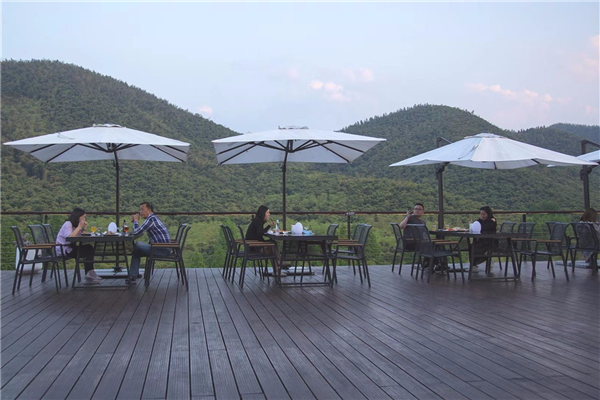New take on tourism comes to Yangtze Delta
 |
|
Tourists enjoy meals at Huixin Retreats, a high-end resort in the mountains of Huzhou, Zhejiang province on May 2. [Photo provided to chinadaily.com.cn] |
The integrated development of the Yangtze River Delta region, including sharing of resources and cooperation on projects, is creating opportunities for the further development of the tourism industry in this area.
Du Yongping, co-founder and general manager of Huixin Retreats, a high-end resort in the mountains of Huzhou, Zhejiang province, is a forerunner in tapping tourism resources.
Targeting consumers from the delta region, Du and a friend came up with the idea of building a resort in Huzhou at the beginning of 2016, based on the city's ecological advantages and geographical proximity to Shanghai and Jiangsu province.
Du, a native of Shanghai's Pudong New Area, said the Huzhou government has supported the Huixin project, from operations to promotion.
"The business climate in Huzhou made me think of the days when the country began to open up and develop Pudong in the early 1990s," he said.
As expected, customers received by Huixin Retreats since the resort opened in November 2018 are mostly from Shanghai and the provinces of Zhejiang, Jiangsu and Anhui, Du said.
"Cities in the Yangtze River Delta region are like neighbors who should join hands with each other for coordinated development," said Du. Based on the delta's integrated development, the resort business has grown steadily, with closer connections to cities in the region.
During the novel coronavirus epidemic this year, the tourism industry in China largely stagnated. However, through a slew of incentives and the comparatively steady market demand in the delta region, Huixin has seen a growth trend after the reopening on Feb 26.
"Due to the virus, people would like to stay at home instead of traveling around these days, so we decided to focus on consumers from Huzhou and neighboring cities as a cushion against the slumping business," he said.
Du lowered the prices on guestrooms and strengthened advertising, which successfully lured local consumers, as well as some from Shanghai.
In May, the average occupancy rate of guestrooms in the resort is expected to surpass 69 percent, a year-on-year increase of more than 50 percent, Du said.
"Although the prices of guestrooms were reduced, the catering sector saw an increase, which generated an estimated year-on-year increase of over 25 percent in revenue in May on the whole," he said.
Du is one of the beneficiaries of delta integration and accompanying tourism development. In Huzhou, tourism now plays a crucial role in the city's integration into the Yangtze River Delta, while the city is working on the ecological conservation and sustainable development of the industry.
Tourism resources, such as Taihu Lake Longemont Paradise, Nanxun town and Moganshan in Deqing, have been promoted in delta cities for deepening cooperation in the industry.
Taihu Lake Longemont Paradise, for example, received 3 million tourists last year, most of whom were from cities in the Yangtze River Delta, Zhejiang Daily reported.
Huzhou has built a smart platform for culture and tourism management based on 5G and big data, technically supporting the city's integration into the delta.
In addition, the city, together with Changzhou, Wuxi and Suzhou, Jiangsu province, protects Taihu Lake and produces tourism products to enhance the influence of the scenic area around the lake.
Huzhou received more than 40 million visitors from the Yangtze River Delta last year, accounting for nearly 40 percent of the total.















